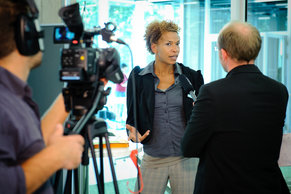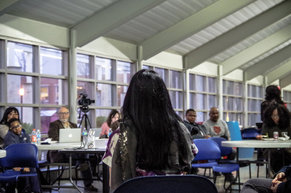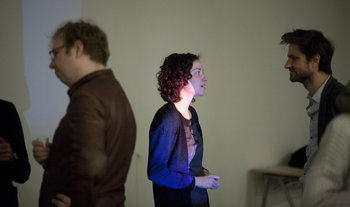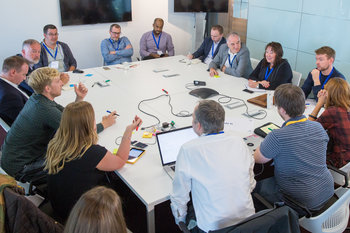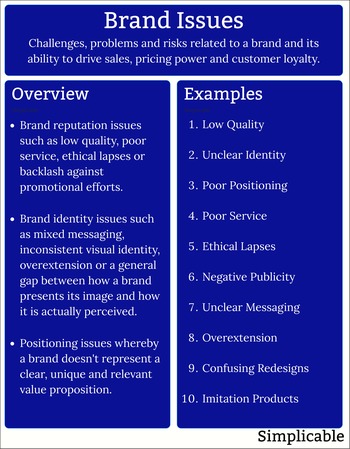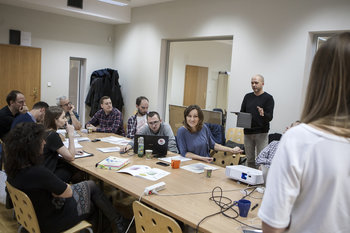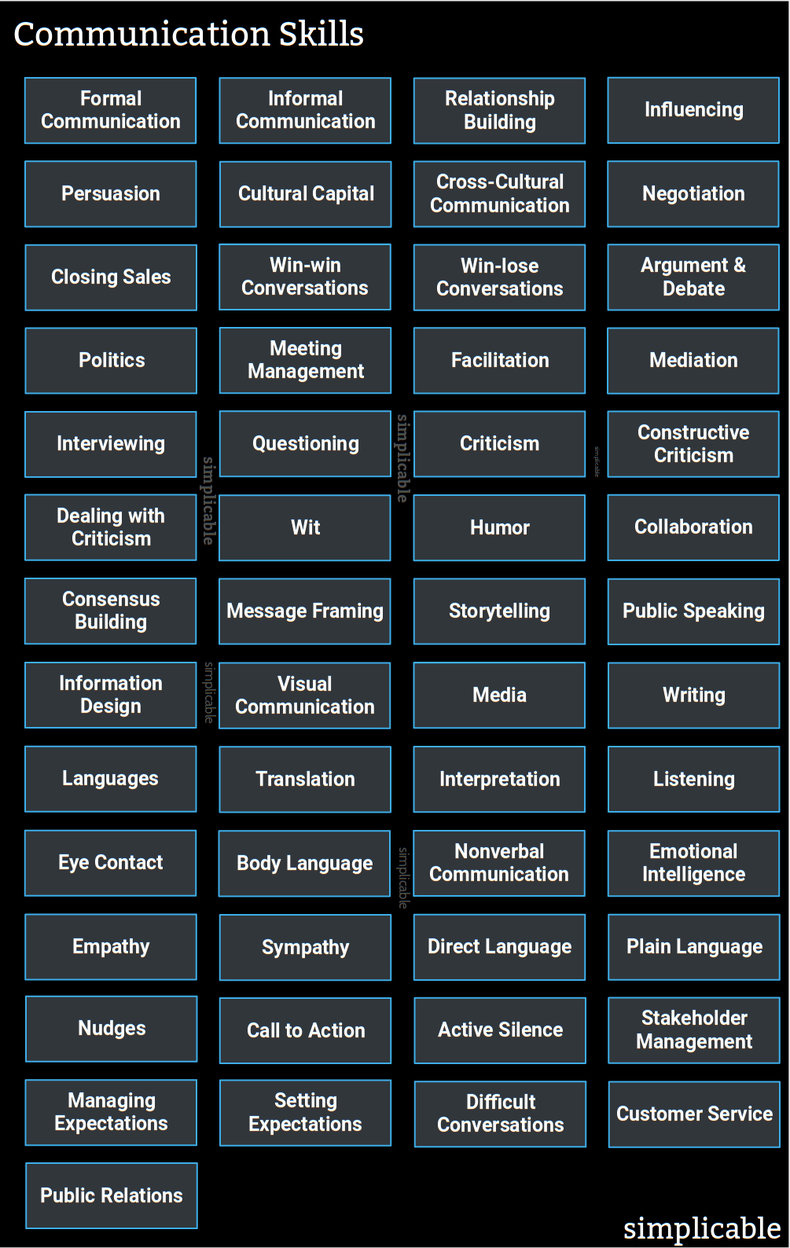
Formal Communication
Communications that require careful and precise language such as answering investor questions in a public forum.Informal Communication
The ability to communicate effectively in regular conversation. For example, being able to build rapport with someone in a short conversation in a coffee room or elevator.Relationship Building
Building and sustaining relationships such as a salesperson who builds a positive relationship with a large number of people in their industry.Influencing
Influencing the actions of others by leveraging communication and relationships.Persuasion
Influencing the thoughts and beliefs of others. For example, convincing people that a risk is serious and imminent.Cultural Capital
The ability to influence, persuade and build relationships in a particular culture. This may require social status and knowledge of the norms and expectations of the culture.Cross-Cultural Communication
The ability to communicate and build relationships where you are an outsider in a particular culture. For example, a German salesperson who is able to close sales in China.Negotiation
Reaching agreements with favorable terms.Closing Sales
The art of getting to yes to close sales. A specialized skill that is highly valued by industry.Win-win Conversations
Supporting the ideas of others and exploring shared opportunities.Win-lose Conversations
Handling situations that are inherently win-lose or lose-lose.Argument & Debate
Engaging in the exchange of diverging or opposing views. An essential process for resolving disputes and actively exploring ideas.Politics
The ability to navigate politics such as office politics to get things done.Meeting Management
Organizing and running meetings.Facilitation
Helping others to communicate by creating direction and structure around a conversation. Facilitation also requires stepping in when a conversation becomes unproductive to get things back on track.Mediation
Assisting others to negotiate a settlement or reach an agreement.Interviewing
Directing a structured conversation whereby you ask questions of someone. This has many variations such as a job interview or market research interview. Interviews may follow a methodology such as a ladder interview.Questioning
The art of asking useful questions to explore information, challenge ideas and debate.Criticism
Developing and delivering critical feedback.Constructive Criticism
Building on the positive when delivering criticism in order to reduce the likelihood it will be received negatively.Dealing with Criticism
The ability to respond to criticism in an intelligent and appropriate way. This includes defending yourself from unfair criticism and accepting fair criticism with grace. Dealing with criticism is an essential element of personal resilience that allows an individual to thrive in an environment of stress and competition.Wit
Wit is mental sharpness that allows you to respond with intelligence and perhaps humor.Humor
The ability to make people laugh is a social skill that is valuable to communication and relationship building.Collaboration
The ability to work with others to be productive and creative as a team as opposed to a situation where each individual is competing to push their ideas forward in an inflexible way.Consensus Building
The process of making decisions as a group.Message Framing
Designing messages to be well received.Storytelling
Storytelling is the art of making information interesting.Public Speaking
The ability to communicate effectively to groups large and small.Information Design
The design of information environments and visualizations.Visual Communication
The ability to visualize information to achieve communication goals.Media
The ability to communicate with various media such as social media or video production.Writing
The art of writing.Languages
The ability to speak multiple languages.Translation
The ability to translate from one language to another.Interpretation
The ability to translate what someone is saying in real time.Listening
Listening with intent to understand and showing that you are interested with elements such as questioning and eye contact.Eye Contact
Information and emotion is conveyed by the eyes. As such, eye contact is considered a basic communication skill.Body Language
Communicating with your body including both active and passive components such as using your hands to give emphasis or sitting up straight to show interest.Nonverbal Communication
A catch-all for conversational elements beyond words. This includes elements such as facial expressions, eye contact and body language.Emotional Intelligence
The ability to read emotion and respond in an appropriate and directed way.Empathy
Empathy is the ability to share an emotion with someone.Sympathy
The ability to sympathize with someone without feeling their emotions. For example, feeling sympathy for someone who has a fear of flying without feeling any such fear yourself.Direct Language
The ability to get to the point.Plain Language
Making your language clear to a broad audience by avoiding needless complexity such as obscure vocabulary.Nudges
The ability to change someone's mind with gentle suggestion as opposed to harsh and commanding language.Call to Action
The effective use of commanding language.Active Silence
The use of silence to further communication.Stakeholder Management
The ability to build and sustain relationships with stakeholders such as investors, employees and regulators.Managing Expectations
Communicating what you will do and will not do in order to manage the expectations others have of you.Setting Expectations
Setting expectations such as a manager who clearly and completely communicates responsibilities and tasks.Difficult Conversations
The ability to communicate negative information or handle conversations that are likely to invoke strong emotions such as anger or sadness.Customer Service
Customer service is a highly specialized skill that requires knowledge of service techniques and patience to deal with a wide range of customer needs. This typically requires a high level of personal resilience.Public Relations
Communications designed to build and defend the reputation of a firm both internally with employees and externally with stakeholders such as investors, community groups and the media.| Overview: Communication Skills | ||
Type | ||
Definition | Abilities, talents and knowledge related to communicating information and influencing people. | |
Related Concepts | ||









